
3313 REVOLUTIONS PER MINUTE

An imprint of Globe Pequot, the trade division of
The Rowman & Littlefield Publishing Group, Inc.
4501 Forbes Blvd., Ste. 200
Lanham, MD 20706
www.rowman.com
Distributed by NATIONAL BOOK NETWORK
Copyright 2022 by Mike Segretto
All rights reserved. No part of this book may be reproduced in any form or by any electronic or mechanical means, including information storage and retrieval systems, without written permission from the publisher, except by a reviewer who may quote passages in a review.
All images are from the authors collection.
British Library Cataloguing in Publication Information available
Library of Congress Cataloging-in-Publication Data
Names: Segretto, Mike, author.
Title: 33 1/3 revolutions per minute : a critical trip through the rock LP era, 19551999 / Mike Segretto.
Description: Guilford, Connecticut : Backbeat Books, 2022. | Includes bibliographical references and index. | Summary: A loose history of the rock album told through critiques of a personal selection of nearly 700 albums released from 1955 to 1999 Provided by publisher.
Identifiers: LCCN 2021044621 (print) | LCCN 2021044622 (ebook) | ISBN 9781493064595 (paperback) | ISBN 9781493064601 (ebook)
Subjects: LCSH: Rock musicHistory and criticism. | Rock musicDiscography. | LCGFT: Discographies.
Classification: LCC ML3534 .S437 2022 (print) | LCC ML3534 (ebook) | DDC 781.6609dc23
LC record available at https://lccn.loc.gov/2021044621
LC ebook record available at https://lccn.loc.gov/2021044622
 The paper used in this publication meets the minimum requirements of American National Standard for Information SciencesPermanence of Paper for Printed Library Materials, ANSI/NISO Z39.48-1992
The paper used in this publication meets the minimum requirements of American National Standard for Information SciencesPermanence of Paper for Printed Library Materials, ANSI/NISO Z39.48-1992

CONTENTS
Guide

F irst of all, a big thanks to John Cerullo for green-lighting yet another one of my book projects and another one to Robert Rodriguez for introducing me to the world of Backbeat Books quite a few years ago. My sincere appreciation to Andrew Grant Jackson for encouraging me to recycle my Psychobabble content (read his books on the music scenes of 1965 and 1973theyre great!). Many, many thanks to Laurel Myers for all of her assistance and encouraging feedback. Thanks too to the design team who cooked up the snazzy cover. Id also like to express my appreciation to Barbara Claire, Bruce Owens, and Meaghan Menzel for their editorial assistance and a special thanks to Uncle Rob Busch, who worked his proofing magic on this book as he did on my first one, The Who FAQ. Thanks to my wife, Elise, for letting me borrow her phone so I could take all the album cover photos that litter this book (and for being all-around fab) and my son, Desmond, an aspiring author who will surely put my work to shame someday. And thanks to my kitten, T. Rex, for ceasing to bite me long enough to allow me to write these acknowledgments (he resumed biting me as soon as I was finished).
Most of all, Id like to thank the many loyal readers who have visited my blog Psychobabble over the years and inspired me to keep writing the material that ultimately found its way into this book.

W hen I was in a small-time Long Island punk band in the early nineties, my greatest ambition was to record an album. Performing onstage was great fun and the optimal way to commune with the people who liked our music (all three of them), but an album is the ultimate expression of a musicians imagination as far as I was concerned. After working out a dozen or so songs in a notebook and perfecting their performances onstage, musicians really summon their songs into existence by recording them in a studio and transferring them to the tangible plastic discs you can drop on a turntable or wing across a room.
I thought my band and I might get our chance to make our own disc when we scored a meeting with a guy whod recently started his own independent label. The meeting did not go as I expected. The guy lived in squalor and didnt seem to have the resources to release music. Even more disturbing than his ominous warning not to use the toilet (I assumed he meant the one in the bathroom and not the disconnected one sitting in the middle of his living room) was that he didnt seem to like music. His agenda was primarily political; he apparently believed that releasing vinyl singles out of a ranch house in Lindenhurst would somehow fell the corrupt corporate major-label behemoth. He explained that his label would release only singles becauseand I quoteno one has ever made a good album. All of them only have one or two good songs. The rest are shit.
This did not go down well with someone whod come of age with Revolver, Whos Next, and Purple Rain. Self-described patriots had their flag; I saluted The Kinks Are the Village Green Preservation Society. Religious types had the Bible; I had Doolittle and the gospel according to Black Francis, Kim, Joey, and David. The Mona Lisa never meant a thing to me; Exile in Guyville meant everything. Basically, the rock album was the most potent and meaningful symbol, text, and artistic medium that my twenty-year-old self could imagine, and I suspected that a lot of other twenty-year-olds felt the same way.
A single? A single is a mere trailer. A long-playing record is a film. The Cars is a big Hollywood blockbuster. Electric Ladyland is a special effectscharged sci-fi extravaganza. Tumbleweed Connection is a western. All Things Must Pass is a biblical epic. Whats Going On is a message picture. Gentlemen is a harrowing relationship drama. Ogdens Nut Gone Flake is a farce. The Piper at the Gates of Dawn is one of those fantasies full of magical creatures and talking animals. The Marble Index is the scariest horror movie ever made. Doolittle is a David Lynch movie. The B-52s is an Ed Wood movie. Dirty Mind is a porno.
The LP can be a disjointed collection of scenes, but at its most effective, it tells a sort of sonic story by the way it moves from track to track toward a nebulous yet satisfying conclusion. In the case of concept albums, song cycles, and rock operas, the conclusion is more explicit but not necessarily more profound. You can have a record playing in the background while you clean your room or do your homework, but ideally, you shut out the lights, slip on headphones, and give that album all the attention youd afford Citizen Kane or 2001: A Space Odyssey. If the album is thoughtfully written, performed, produced, arranged, and packaged, it might reward your attention. If not, it might at least rock your socks off.
Even during the days when making music was a lot more important to me than writing about it, I had a borderline academic fascination with the rock album. I ate up books like Tim Rileys
Next page

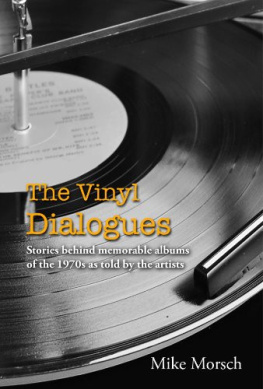
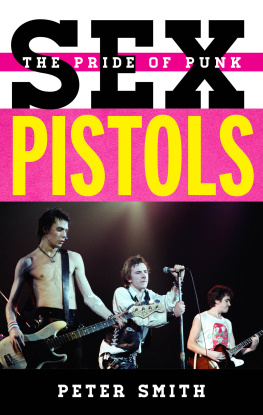
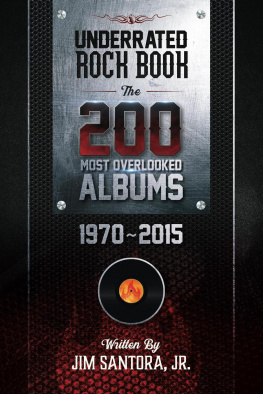
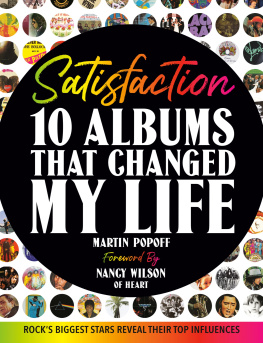
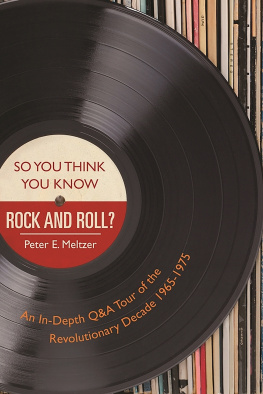
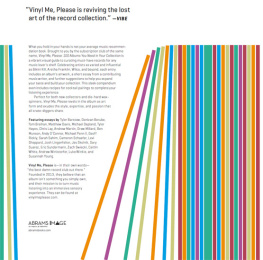
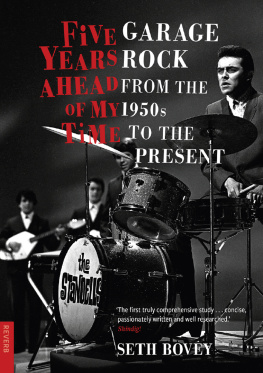


 The paper used in this publication meets the minimum requirements of American National Standard for Information SciencesPermanence of Paper for Printed Library Materials, ANSI/NISO Z39.48-1992
The paper used in this publication meets the minimum requirements of American National Standard for Information SciencesPermanence of Paper for Printed Library Materials, ANSI/NISO Z39.48-1992